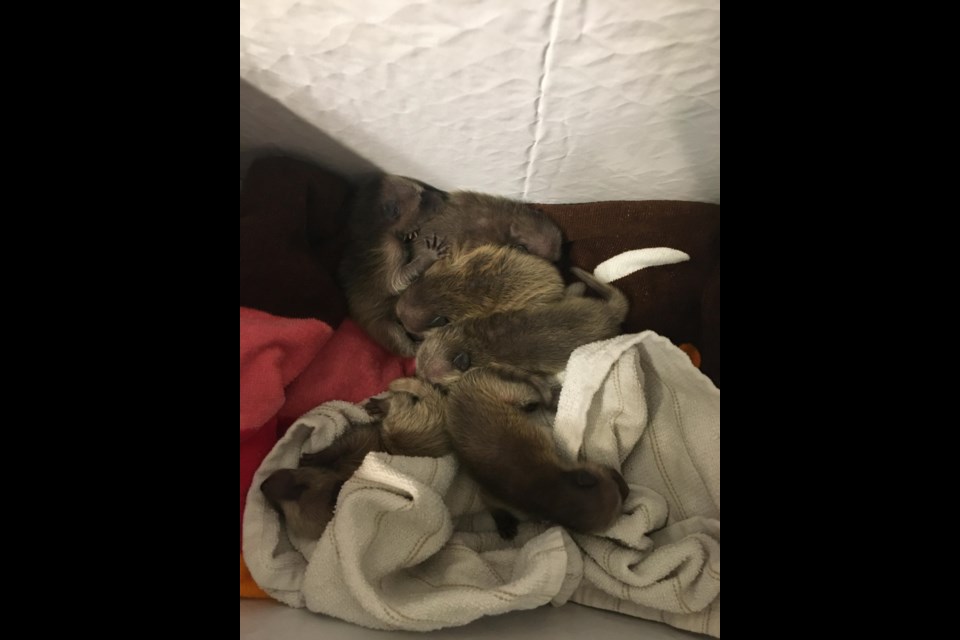A Guelph resident is extremely upset with how the Guelph Humane Society handled a situation in which they euthanized six baby raccoons she rescued.
The Guelph Humane Society said it took the right actions for the particular situation, but that hasn’t stopped Chloe Robinson from lashing out against the organization on social media.
Robinson, a British native who previously worked as an ecologist and bat rehabilitator, said she located six baby raccoons on the side of Forestell Road on March 30 after someone posted a photo of the kits on Facebook.
Concerned about their safety, Robinson said she headed over to the location to find raccoons that appeared to be dumped and cold with scraps of insulation fibre around them.
“I assessed that the risk of these days-old kits transmitting rabies to me as incredibly low, and therefore I used a combination of a tea towel and my bare palm of my hand to transfer the babies to an insulated box with heat pads. My main focus was getting these babies warm and stable,” said Robinson.
She said once she called the Guelph Humane Society, they told her to return the kits to the location she found them for their mother to return. With no mother in sight, Robinson said she was in the process of handing them over to a licensed raccoon rehabilitator called Mally's Third Chance Raccoon Rescue & Rehabilitation Sanctuary
She said that’s when a worker at the Guelph Human Society called her and demanded the animals be handed over to them.
“He told me because we touched them that this is now a Public Health case and I needed to listen to him,” said Robinson.
Robinson said she told the GHS that she had the right to hold the animals for 24 hours with the purpose of transporting them to a licenced rehabilitator but was told she couldn't do that.
She said the worker at the Guelph Humane Society continued to call her after 9 p.m that night demanding the animals be returned.
Humane society Executive Director Adrienne McBride told GuelphToday the baby raccoons were euthanized because they were handled by humans and could not be traced to a specific point of origin.
“Those are key factors that did not make them good candidates for the authorized wildlife rehabilitation organizations GHS works with,” said McBride.
Robinson said she called Public Health who said they didn’t classify this as a risk to exposure to rabies because of the age and lack of bites and scratches from the babies. She said she also went to her physician and was cleared from any risk of rabies.
Public Health did not immediately return a request for comment.
Robinson returned the baby raccoons to the GHS. Robinson said she never heard back directly from the GHS and upon contacting them learned that the babies had been euthanized.
Sandy Donald, director of Ontario Wildlife Rescue said according to the Wild Life Conservation Act, the point of origin in terms of wildlife is the point the animals were found. He said when a rehabber raises an animal, you’re supposed to release it within 15 km of where it was found if it’s young and if it’s an adult it should be released within one km.
“It makes no bloody sense. There’s no other way to put it,” said Donald.
Robinson said according to the Wild Life Conservation Act, the kits could have been raised by the rehabber she was taking them to and put back right where she found them.
“I literally dropped a point on the map for the staff that took them,” said Robinson.
Donald said the GHR claiming that they did not know the point of origin is completely false because they were evidently found dumped on the side of the road.
“To kill a wild animal because you don’t know exactly where it came from, it does not say that,” said Donald referring to the Fish and Wildlife Conservation Act.
“At no point in the act does it say ‘if you do not know where it was captured, then you have to kill it.”
“I’ve raised umptieth raccoons over the years and you have to handle them,” said Donald about not using gloves when touching the newborns especially.
He said the way the law is set up is that if you find an injured orphaned wild animal that’s native to the province of Ontario, you’re supposed to get it to a wildlife rescue centre of wildlife rehabber within 24 hours which is what Robinson was doing.
“On those counts they’re wrong. Also, they have no authority to interfere and what they did plain and simple was wrong. The animals should not have been put down. No definitely,” said Donald.
McBride said the style of communication used by the officer who handled the situation didn’t match what Robinson expected.
“We absolutely understand that in an ideal world, all animals and all domestic animals could be rescued but it’s just an unfortunate reality that not all wildlife, in particular, can have a positive outcome and I know that’s upsetting for community members and its upsetting for our staff members,” said McBride.
She said as an organization, the GHS saw the euthanizing of the raccoons as a much compassionate end for animals rather than them suffering on the side of the road.
“We listened to the community member’s concerns and we did our best to address them. I think what’s unfortunate about wildlife rescue is that we can’t rescue and create a positive outcome for all animals in our community.”
“Certainly, in this case, we did recognize that there was a challenge with the communication style between our team and the community member and from our perspective we worked to address that both within our team and within discussions with that community member."
